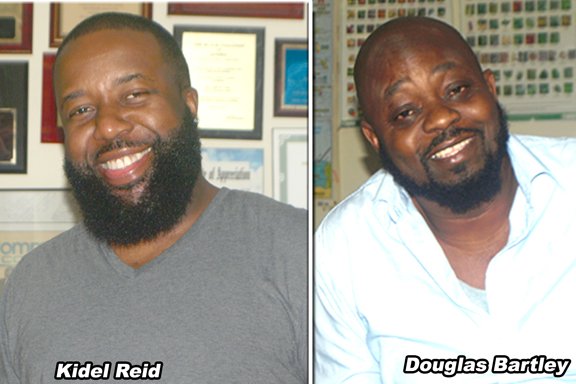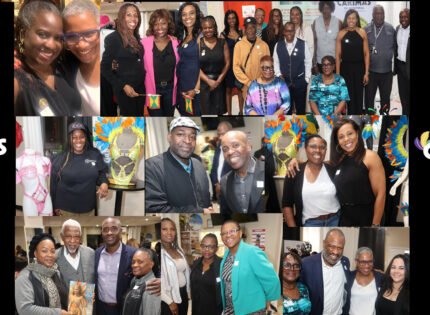Douglas Bartley devotes much of his spare time helping others
An educator at heart with community in mind
Egbert Gaye
Douglas Bartley cherishes his role as an educator together with his strong ties with the community and the opportunity they provide him to impact on the lives of others.
“I see myself as a mentor, who is always ready to help anyone who is on the path to improving themselves,” he told the CONTACT in a very late night interview at our offices. “The way I see it, when I’m able to help, especially the young ones, I’m automatically improving my quality of life because it’s a step to make the community a better place for all.”
Fortunately for the community, Bartley has a lot to offer.
He is a Math teacher at the English Montreal School Board attached to the St. Laurent Adult Centre and education coordinator and tutor at the Jamaica Association of Montreal.
In addition to his day-job, Bartley devotes a ton-load of his time doing community work and assisting those in need of his service as a tutor or more informally as a tutor.
He says he believes strongly in his role as a mentor and that of the community in helping to salvage the lives of young men and women many of whom are dropping out of school at alarmingly high rates.
“We have to catch the problem early,” he says. “And if parents cannot help, then it’s up to them to access what’s available in the community, like programs at the Cote des Neiges Black community Association and at the Jamaica Association.”
After more than a decade as an educator and community worker, Bartley has identified what he says are the biggest impediments to success among our kids and inevitably to progress in our community.
“The root of the problem remains the lack of social skills and illiteracy among many of our young people and it’s time for us to recognize it as obstacles to progress. And there’re many good programs in the community that can help to turn it around.”
And agrees that much of the problem our youth face hinges on their struggle to find their place in society.
He says community organizations have always played significant roles in helping to mold our youth, only these days the focus is a little different.
“Back in the day the Negro Community Centre was the place Black folks turned to for help. The focus then was towards athleticism and music and they were successful in helping to bring forward many good musicians and athletes.”
These days, he says, the emphasis has to be on helping our youth develop proper social skills and education to function in a more complex society.
And because so many of our children are having difficulties functioning in the education system, he believes that it’s up to the community to support organizations and help them acquire the resources needed to pick up the slack.
Sadly, he says, that’s not happening.
“Organizations are not getting the support they deserve from the community and that’s too bad because these groups have crucial roles to play in our development.”
Bartley says it’s unreasonable to look to our youth to support these organizations in any significant manner because many of them are at the “peak of their careers and the peak of their youthfulness and therefore are focused on building their own personal brand.”
“I see it as a calling for those who are in their mid forties and over to (bolster) these organizations and help to make them more effective for themselves in their golden years and for the future of their children.”
Also, he added that it’s highly important for the few organizations that are still in place to work together for the benefit of the community.
“I know that every organization has its own agenda and there’re many self serving leaders but it’s important that they come together in solidarity and find ways to work on common causes on behalf of the community.”
In the meantime he says, he will continue to do his part as an educator, mentor and community worker.
Program brings together Education and community to benefit participants
CAAP paves the way to a good job
Egbert Gaye
In the three years that the Community Academic Achievement Program (CAAP) has been in place, hundreds of students have used it to position themselves to build better futures.
The education program, which is accredited by the English Montreal School Board (EMSB), offers adult participants opportunities to acquire basic literacy skills, high school diplomas and a chance to enter the vocational stream on their way to a high-paying job.
“It’s the way forward for many young women who have participated in the program over the past few years,” says coordinator Kidel Reid. “Many of them come from difficult situations and are making sacrifices that will lead them to better paying jobs and better lives for their families.”
The program offers accreditations in French and Math, which are taught by teachers supplied by the EMSB and can be applied toward high school diplomas.
“A high school diploma is an important first step in getting to the next level of training for many and being able to work towards attaining in a program such as this is a major accomplishment,” says Reid.
Douglas Bartley a math teacher out of St. Laurent Adult Centre teaches the subject in the program.
He’s amazed by the response he has been getting from participants in the program.
“Many of them have been out of school for a while and need a lot of remedial work but it’s amazing to see how enthusiastic they are to learn,” he says. “It even motivates me.”
As the driving force behind the program, which was initiated in 2015, Reid wants as many community members as possible to take advantage of the opportunities CAAP offers
He says the basic training in adult literacy with English as a central point of learning is an ideal starting point and opens the door to an exciting future for many.
Myrnelle Anderson a former elementary school teacher in Jamaica is one of the tutors in the program. She told the CONTACT because participants are “so enthused about the prospect of learning,” her job is made easier and in the six or seven months that she has been part of the program, she has witnessed a lot of progress in many of the students.
Anderson is one of a corps of trained tutors supplied by Frontier College.
Other tutors assist in the program’s bilingual academic stream, which offers French for beginners and at an intermediate level for those seeking to enhance their skills in the language.
Reid says much of CAAP’s success hinges on the fact that it’s delivered in an environment that’s “comfortable and conducive to learning.”
“Because it’s based in the community (runs out of the Cote des Neiges Black Community Association) and all the teachers are Black, they are able to relate,” he says.
He added that although it’s still to early to gauge the impact of the program, he can still point to individual achievements with students succeeding in provincials high school exams and moving on to study at Vanier College.
“What’s definitive is that: whoever participates in the program, comes out a better person.”
However, he is troubled by the fact that most of his participants have been women whom he says are seeing the importance of education as a tool for future success and are preparing themselves to shoulder the burden of caring for families.
“Too many of our young men are missing in action,” he says. “And still too many are sitting at home or trying to be part of the game (the hustle with jewelry and fast cars).”
“It doesn’t work,” he adds. “It leads to trouble with the law and sometimes incarceration. After that all is lost.”
Reid’s advice to young men who haven’t been able to navigate the education system is to see a path to the future by this community school and get on the road to acquiring a top-paying trade such as plumbing, electrician, auto-mechanics, pastry making or in construction.
These young men have to realize that the time for action is now, he says.
“You’ve to put some shame in your game.”
Reid says it’s important that we continue to build this education initiative, “ because knowledge is key.”
“It’s the only way we can improve ourselves and build our community.”
As such he says, everyone in the community has a stake in making sure that the program succeeds, especially having the unwavering support of the EMSB, which is prepared to invest more teachers and even more space to make sure that anyone who wants to learn has an opportunity to do so.
The CAAP courses are offered every Saturday at the CdNBCA 6585 Cote des Neiges. Info 514 737 8321














